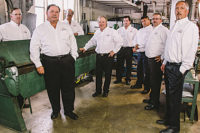“Personally, I’m out on the jobs. I oversee it,” he said. “But it takes constant communication from the office staff to the supervisors to the foremen. They know what our expectations are for them. They know what the expectations are for the installation of the roof system. They know our expectations for the quality of the roof system when they are done. It’s from the top down. They understand exactly what’s expected of them — and they do it.”
There’s no secret recipe for success in this industry, according to Marshall. “You have to know what you’re doing and you have to get the job done.”
He founded Marshall Roofing & Sheet Metal in 1991. The union shop, which has about 60 employees, specializes in commercial and multi-family residential work, most of it new construction.
For Marshall, quality workmanship is the key to creating a satisfied customer — and that’s his ultimate goal. “I built this business on the same basic principles that I learned from my father and his associations with customers,” he said. “And that is, to service the customer, have good quality installations, good information for the customer when they ask for it, and competitive pricing because no matter how good you are, you still have to have a good price. It’s working relationships — we’ve built our company with relationships, which is simply continuing the tradition of what I learned working in a family business.”
The Family Business
Marshall grew up in Reading, Mass. After graduating from the University of Maine, he joined his father’s roofing company. It took a little friendly persuasion.
Marshall’s father, Ken Marshall, was an industry veteran who ran Federal Sheet Metal and Roofing Co. He also served as president of North East Roofing Contractors Association (NERCA), and he urged his son to enter the family business.
“I used to receive propaganda mailings from my father and mother while they were on a trip with the association or with a manufacturer back in the day. But after working a few summers in roofing, I figured it was probably the last place I wanted to be,” Marshall remembered.
“After I graduated I had a couple of job offers, and I talked to my father about them. He matched the top salary offer, plus a car, so I took the job and I’ve been involved ever since. I have to say that working with my father in the family business, and my brother who also worked in the business, has been a great experience. I’ve enjoyed it very much.”
He started out at the bottom. “I joined the company in 1981, and I did what everyone does starting out in this business — I was cleaning dumpsters, doing anything that anybody with any experience didn’t want to do. That’s the way I learned the business.”
As his father began to phase himself out, Marshall and his partner, Mike Kelly, started Marshall Roofing in 1991. Marshall’s father was a trusted advisor until he officially retired in 2003. “I think he retired about five times,” said Marshall. “He loved the business and he was always around. He fully retired in 2003, and that was quite a party.”
Over the years, the company grew slowly but steadily, and soon they were competing for marquee projects. “The biggest project I remember getting excited about was the new Fleet Center, the new Boston Garden in Boston,” he said. “It had to be a good 20, 22 years ago. That was right as we were starting up Marshall Roofing and phasing out Federal Sheet Metal and Roofing. That was a big one.”
PVC roof installation went smoothly, and the company had its first high-profile project under its belt. “It was a landmark roofing project because it was the new, big stadium in Boston. It’s one of the first buildings you see as you enter Boston, so it was an exciting project for us, and it was a very competitively bid project. Fortunately, we had a good relationship with the general contractor, and essentially that’s what it came down to — having a good number, a good relationship, knowing the right people, and being able to close the job.”
Green Growth
The company’s first venture into vegetative roof systems was a defining moment. “What’s made us successful is we look at things very conservatively,” he said. “I always look at the work I’m going to perform as a full-service contractor. So for instance, when we got into green roofing and green roof assemblies maybe 14 years ago, we quickly learned the liabilities of having a landscaper trouncing around on the roof.”
The first vegetative system they installed was for the Millennium North and South Towers in Boston. The general contractor had hired a landscaper to install the growth media and plants after Marshall Roofing had installed the waterproofing that would lie beneath it. It was an occupied area, and Marshall was not about to take any chances. He wanted to handle all phases of the project himself. He consulted the local rep for the membrane manufacturer and talked him into it. “I said, ‘Look, we want to provide the owner with a single-source responsibility. We want to do this, but we want to make it so we never have to come back or even consider what we’re going to do if there is a leak.’”
Marshall Roofing installed a four-ply APP torch-down system and tested it before the garden elements were brought in. “We water tested it, we crawled all over it, and before we buried it we made damn sure that thing didn’t leak,” he said. “Ever since then we’ve been very involved in the garden roofs. About eight years ago I started a ‘roofscape’ company so we could perform everything from the roofing application to the landscaping installation — a complete garden roof installation. I wanted full responsibility for the assembly. If someone drops a screw, it’s our guys there and they are picking it up before they cover it with drainage mat or soil or anything else.”
Recent Projects
The focus on green roofing assemblies continues today. “We’ve done a few of these now,” Marshall said. “We’ve really become comfortable with this application and the intricacies, difficulties, and the challenges they present.”
For the McCallen Building in Boston, challenges included a roof with 20-degree pitch. Marshall worked with the manufacturer, who developed a soil retention system that would hold the soil in place on that slope to allow the plant plugs and sedums to be planted. “You can see the sloping roof garden from the street level, and it’s pretty unique,” he said.
Other recent landmark jobs include the Dana-Farber Cancer Institute, a 15-story building with multiple roof levels, garden roofs and the top mechanical room. “It was an exceptional job, really an enjoyable job,” said Marshall. “It was very challenging, and both Dana-Farber and the general contractor were very pleased with the results.”
A recent Boston College project involved 450 squares of Ludowici tile. “I hadn’t installed a Ludowici tile project in about 20 years,” Marshall noted. “We put a great team together, we worked with the architect to overcome some design issues and we had a very successful job. The customer was very happy. Boston College was very complimentary on the final result. If the customer’s happy, that means we’ve done our job.”
The company has weathered the recent recession and Marshall is optimistic about the future. He sees signs that things are picking up. “It’s nice to drive through Boston now and see tower cranes. Tower cranes in Boston have been missing for three or four years. Boston is booming now, Cambridge is booming. We’re starting to see a lot of development happening in this area, and we’re very happy to see it.”
President of NERCA
Boston will be the site of this year’s NERCA annual convention, which will be held March 12-14 at the Hynes Convention Center. Marshall is thrilled to have the event in home town. He is currently serving as the NERCA president, and he credits his father and other members of the association for encouraging him to become actively involved.
“I got started with NERCA just through going to the conventions, meeting the people, and forging relationships and friendships with other members in the association,” he said.
He maintains the association is an integral part of his company’s continued success. “The association has absolutely helped me personally and it has helped this company become a better company,” he said. “Primarily through the educational opportunities, the networking, the relationships with other contractors and manufacturers. What the NERCA brings to the table is very strong and very beneficial to the contractors. They keep us up to date on OSHA standards, and on government regulations. It’s very informative; it’s constant education. For someone like me running a small business, it’s invaluable.”
The association also keeps members educated on new technologies, including advances in vegetative roofing, and photovoltaic systems. “These are business opportunities for companies like mine,” he said. “By being educated in these areas, it lets us go out and show our clients that we’re competent and reliable to perform these new green technologies that are associated with the roofing systems they want installed in their buildings. So it’s important that we keep that information flowing. We provide that information to our members, and it benefits everybody.”
After all, for Marshall, it all comes down to quality work and satisfied customers. “We work on the success of previous jobs to get new jobs,” he said. “I don’t think it’s anything unique; it’s providing the customer with the confidence that we are going to do a good job, and the next time they are looking for a roofer they are going to be talking to us.”
Marshall recounted the story of a recent conversation with his 13-year-old son Nicholas to show there is no secret formula for success. When Marshall asked his son what he thought of the economy, his son replied, “It’s bad.”
Marshall asked his son if he thought the economy would improve fairly soon, or if it would take a long time. His son replied, “It will take a long time.”
Marshall asked another question. “If you had a small business — say you had a bagel company, or you were selling tools or you had a roofing company — what would you have to do to survive?”
His son replied, “You have to be good.”
“And I thought for a second,” Marshall recalled, “and I said to him, ‘You’re right. It’s that simple. You have to be good!’ That’s what the NERCA and similar organizations allow you to be — they allow you to be good, with an opportunity to be better.”
For more information about the NERCA Convention, visit www.nerca.org.










Report Abusive Comment